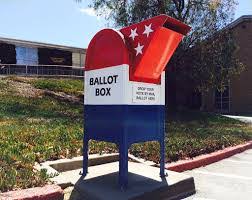Republicans are heading back to court to force Pennsylvania Democrats to follow election law and a new U.S. Supreme Court ruling regarding ballot security.
Last week the U.S. Supreme Court backed a Pennsylvania law requiring absentee ballots to be dated before being counted, reversing a 3rd Circuit Court of Appeals Court opinion. Now the Republican Party at the state and national levels is suing to require Pennsylvania’s Secretary of State to abide by the high court’s decision.
Following a joint lawsuit filed Monday against the Commonwealth of Pennsylvania for planning to illegally accept undated mail-in ballots, RNC Chairwoman Ronna McDaniel, NRCC Chairman Tom Emmer, and PAGOP Chairman Lawrence Tabas released a statement.
“As the Pennsylvania legislature and U.S. Supreme Court have made clear, undated mail-in ballots should not be counted. Republicans are holding Pennsylvania Democrats accountable for their brazen defiance of the Supreme Court and the rules duly set by the legislature. Pennsylvania Democrats have a history of election integrity failures and Pennsylvanians deserve better: this lawsuit is the latest step in Republican efforts to promote free, fair, and transparent elections in the Keystone State.”
Supporters of the lawsuit point out that practically every legal document must be dated. Moreover, in at least 17 states, absentee ballots are counted after polls close on Election Day. Another 16 states allow counting to begin on Election Day. And then, says J. Christian Adams with the Public Interest Legal Foundation, there is the issue of basic fairness.
“States need to follow their own election rules. When they don’t, the losers in elections doubt the fairness of the process,” Adams said.
Democrats insist the court’s ruling does not prevent them from counting improperly-cast ballots. Acting Secretary of State Leigh M. Chapman said county elections officials should still count mail-in votes that arrive in exterior envelopes with inaccurate or nonexistent dates, despite a requirement in state law that they must have them.
And former Hillary Clinton attorney Marc Elias, a leading force behind Democratic efforts to block ballot security policies, said that while the Supreme Court may have ruled the 3rd Circuit’s decision moot, “they didn’t say it was wrong.”
As the fight continues in the Keystone State, the high court’s order has a national impact. It sends a message that Democratic activists and their allies in the judiciary cannot just misuse the Materiality Provision of the Voting Rights Act to attack common safeguards. The 3rd Circuit panel tried to use the provision to strike down what should seem the simplest voting requirement.
Republicans argue this case proves Democrats oppose any ballot security measures by labeling them all forms of voter suppression.
When Georgia passed its voter law in 20201, President Joe Biden described it as worse than the racist abuses of the South’s Jim Crow era (“It’s Jim Eagle!”). And he compared U.S. senators who would not kill the filibuster to pass a federal law overriding Georgia’s rules to segregationist Bull Connor and Confederate President Jefferson Davis.
A Gallup poll this month showed 79 percent of voters support voter ID, with big majorities across demographics.
Most voter fraud convictions are related to mail-in ballots—including those tied to a North Carolina congressional race overturned in 2018 after a ballot harvesting scam was uncovered.
Such voting is particularly vulnerable when ballot harvesting is allowed. It is the practice of political operatives or non-governmental actors collecting and distributing massive quantities of absentee ballots. That opens the door to both voter intimidation and ballot tampering.
“Absentee ballots remain the largest source of potential voter fraud,” the 2005 bipartisan Carter-Baker Commission reported. “The practice in some states of allowing candidates or party workers to pick up and deliver absentee ballots should be eliminated.”
The Republicans who brought the lawsuit point out it was the second time in recent weeks that the RNC has brought litigation to remedy this type of issue. The RNC is involved in 71 cases of election integrity litigation in 20 states this cycle, it says.
“Pennsylvania Democrats’ consistent disregard for the election rules set by the legislature has resulted in Pennsylvania being a national election administration laughingstock.”
Please follow DVJournal on social media: Twitter@DVJournal or Facebook.com/DelawareValleyJournal


